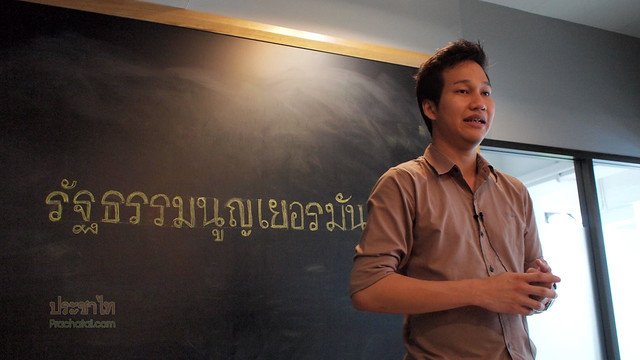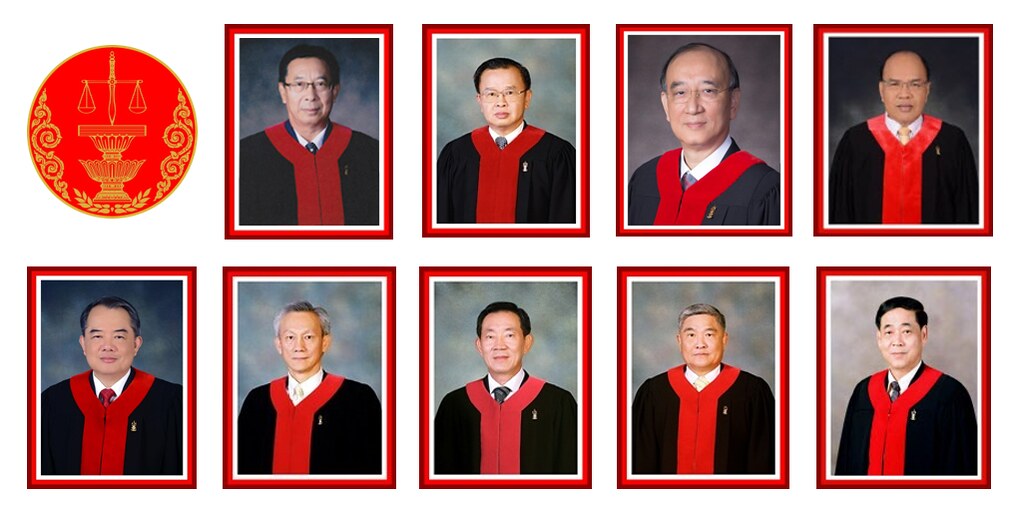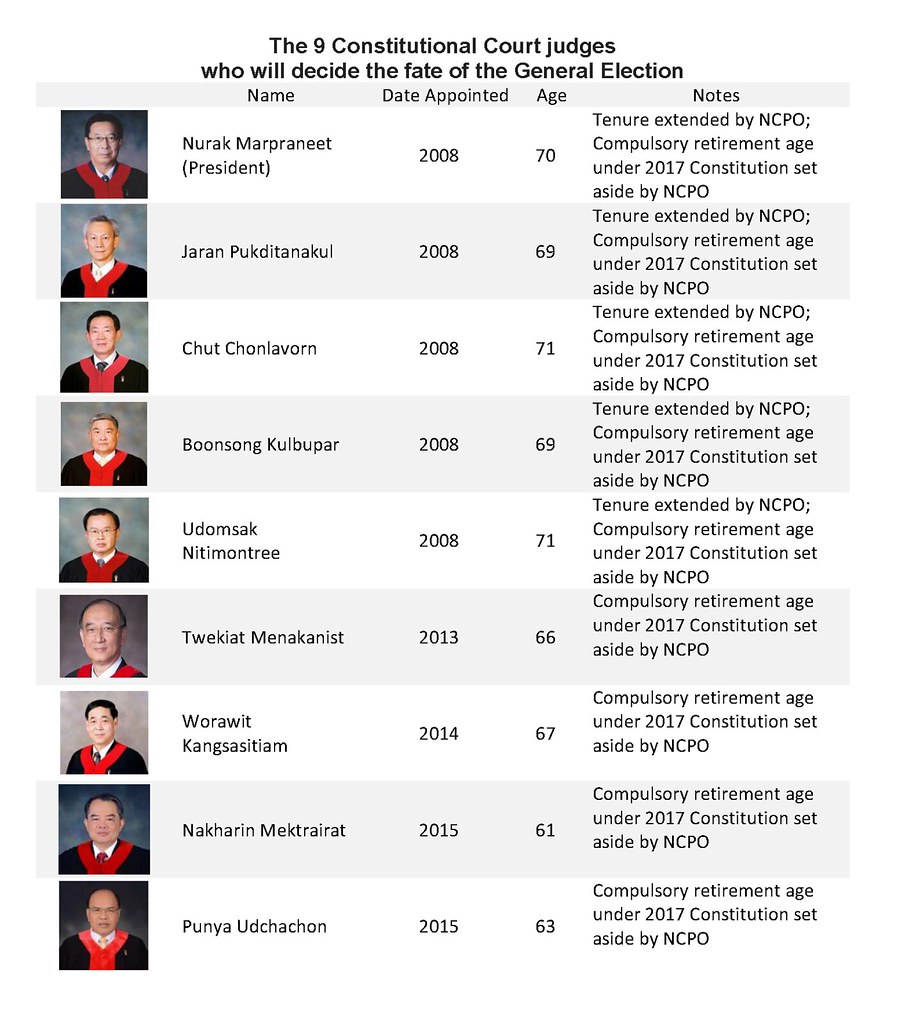The government will soon face a showdown in parliament over its oath error. Here is a recap of all that has happened.
It has been almost three months since Gen Prayut Chan-o-cha and his Cabinet attended the constitutional oath-taking ceremony before King Vajiralongkorn on 16 July 2019. 9 days later, Piyabutr Saengkanokkul spotted a mistake in the oath and consulted with the Speaker of Parliament about what to do, as the words that were spoken deviated from the oath as stated in Section 161 of the 2017 Constitution.
A sentence was omitted and a word was added:
‘I, (name of the declarer), do solemnly declare that I will be loyal to His Majesty the King and will faithfully perform my duties in the interests of the country and of the people. I will also uphold and observe the Constitution of the Kingdom of Thailand in every respect. Forever.’

Piyabutr claimed that the Cabinet may technically have not yet taken office because of the oath error. On 31 July, Wissanu Krea-ngam said everything was in accordance with the procedure and complete. Surrounded by reporters, he said a day later he did not know why the mistake happened. ‘Someday you will know that you should not talk,’ he said.
The now three-month-long controversy began. Many consider it trivial, but some see that constitutionality and the status of monarchy in a political system are at stake.
The war of interpretation
On 4 August, Anudit Nakornthap, Secretary-General of the Pheu Thai Party, demanded that the government explain the incomplete oath and correct the mistake. A day later Gen Prayut insisted the oath had been comprehensive and constitutional. The most important thing, he said, was that it was in accordance with the King’s first speech on the day of his coronation. On the same day, Srisuwan Janya, nicknamed ‘Thailand’s complainer-in-chief’, petitioned the Ombudsman to file a complaint with the Constitutional Court and the Administrative Court about the constitutionality of the oath.
On 6 August, Paisal Puechmongkol, an aide to Deputy Prime Minister Prawit Wongsuwan, said that if the oath was incorrect, it meant that Prayut’s pre-election cabinet and the NCPO still remained in power with the absolute authority of Section 44. Next day, Suthin Khlangsaeng, opposition whip from Pheu Thai, requested a parliamentary session to question the Prime Minister about the matter.
However, Gen Prayut did not appear in Parliament because he went to the south of Thailand. Gen Prayut said on 8 August “Soon it will be in order because I had no intention to do wrong.” Similar to statements by dictator Sarit Thanarat (Prime Minister 1957-63), he added he would take sole responsibility.
On 10 August, Bhokin Bhalakula, chair of the Pheu Thai strategic committee for policy and planning, said that everything the government has done will be invalid if the oath was incomplete. Three days later, Prayut declined to answer when faced with reporters’ questions.
On 14 August, Piyabutr requested to question the PM in Parliament. Gen Prayut, again, did not attend the session. House Speaker Chuan Leekpai said the Prime Minister must explain why he did not attend the session. Wirat Warotsirin, deputy leader of the Seri Ruam Thai Party, asked the Speaker whether the mistaken oath constituted royal defamation and whether a royal pardon should be requested.
But on that day Prayut went to take part in a tug-of-war, a football match, and handing out meals to blind students at the Foundation for the Blind in Thailand in the morning and did not attend the afternoon session of Parliament. A day later he said he had no reason to attend because the case had been filed against him with the Ombudsman.
On 16 August, the 7 opposition parties requested Parliament to open a general debate about the oath ceremony. Suphachai Phosu, Deputy House Speaker, said the debate may start after August because of the ASEAN Inter-Parliamentary Assembly in the last week of August. On 21 August, Piyabutr asked to question the Prime Minister in Parliament, but Gen Prayut avoided it again.
The King’s letter
The Ombudsman announced that it would rule on 27 August whether a case should be filed with the Constitutional Court. But something unexpected happened. One day before, the government announced it was holding a ceremony before King Vajiralongkorn’s portrait to receive a royal letter. On 28 August the content of the King’s letter was revealed to be the same as the speech given at the oath-taking ceremony. The request for the letter was made by the government to the palace.
“I want to take this occasion to wish you encouragement, confidence, and determination to do your duty in line with your oath for the benefit, happiness, and security of the country and the people. Any work must have obstacles, must have problems. Therefore, it is normal to have to solve the problems and get to work, so that the administration of the country runs smoothly according to the situation through solutions direct to the point and with strength and forbearance.
I wish the cabinet and government the encouragement and force to do your duty with righteousness.”
“It is held to be immeasurable royal kindness with regard to the oath-taking” said Gen Prayut after the ceremony. He also said “I could not say if this can end the other issue or not,” as he explained that the letter will be kept in Government House.

Gen Prayut showing the King's letter before the press
According to Matichon Weekly, this was not the first time the government had requested a letter of encouragement from the King. Banharn Silpa-archa did it in the mid 1990s, but this was the first time that the Cabinet held a ceremony to receive the letter. Wissanu Krea-ngam insisted that the ceremony was not a second ceremony to correct the earlier oath-taking mistake.
Regardless of the Cabinet’s motive, legal experts insisted that under the principle of the constitutional monarchy, the King’s letter has nothing to do with the issue. Sriamporn Saligupta, a senior judge of the Court of Appeals, said in an interview with Matichon that it is the royal prerogative of His Majesty to give advice to the government, but since the King cannot meddle in politics under the Constitution, it is inappropriate to confuse His Majesty’s encouragement with the dispute which will be decided by the Constitutional Court.

Poonthep Sirinupong, of the Faculty of Law, Thammasat University, and a member of the Nitirat Group (Law for the People)
Poonthep Sirinupong, of the Faculty of Law, Thammasat University, and a member of the Nitirat Group (Law for the People), shared the same concern. In his opinion, the Cabinet has officially been appointed in the Royal Gazette - with or without the oath. And the Cabinet has been sworn in with the acceptance of the King, so it can start functioning according to the Constitution. It was just that the oath was not correct, so the Cabinet should hold the ceremony again to conform to the Constitution.
“Even if there was no intention to violate the Constitution, the lack of intention does not erase the incompleteness of the oath. It is still a Cabinet which has not completed the oath according to the Constitution. It must hold the oath-taking ceremony again because it is their duty to take the oath by saying the whole statement completely so that the problem can end.”
Not to do so may cause a constitutional problem since the King’s advice cannot correct the incorrect oath of the Cabinet, added Poonthep. However, at times the King’s advice takes the form of law in Thailand as the royal announcement against the nomination of Princess Ubolratana as the prime minister candidate for the Thai Raksa Chart Party - which was against the principle of the constitutional monarchy.
“Royal advice does not have the force to make unconstitutional practice constitutional, but royal advice also does not have to take responsibility for the unconstitutional oath. Here, a clear distinction must be made. This explanation is to preserve the status of monarchy in a democracy.
If the King allows or approves, despite the incomplete oath, it means you tie this issue to the King’s power of judgment, giving the King the power to decide this issue and the discretion to accept or not accept any cabinet. It means in the future the principle becomes that the King can reject any cabinet, doesn’t it? Do you really want to live in a regime which constructs an explanation which leads to that point?”
The Constitutional Court’s decision
The Ombudsman has decided to file the case with the Constitutional Court, but not on the grounds of the complaint submitted by Srisuwan Janya. Raksagecha Chaechai, Secretary-General of the Office of the Ombudsman, declared that Srisuwan’s complaint, based on Article 23 of the Organic Law on the Ombudsman, was invalid because that Section applies to laws enacted by the legislative or executive branches. The oath does not count as a law.

 9 judges of the Constitutional Court
9 judges of the Constitutional Court
Source: Constitutional Court
Instead, they accepted a complaint submitted by Phanupong Churak, a student from Ramkhamhaeng University, who reasoned that the government must swear the oath as written in Section 161 of the Constitution. The fact that the cabinet members did not say they would respect the constitution, probably causing the later actions of the government to be invalid, means they violated the rights and freedom of the complainant, based on Section 213 of the Organic Law on Constitutional Court Procedures.
Ruangkrai Leekitwattana also filed a complaint directly with the Constitutional Court. Based on Section 161 and 162, Ruangkrai argued that the cabinet’s oath error and its policy announcement which lacks elaboration on budget source was the use of rights or freedom to overthrow the regime of democracy with a monarch as a head of state.
On 11 September, the Constitutional Court dismissed both complaints. Phanupong’s case had to be dismissed because the procedural law does not allow them to prosecute the cabinet in such cases:
“…the 2018 Organic Law on Constitutional Court Procedures, Section 47, staes that ‘the use of the right to file a complaint based on Section 46 must be about the actions which violate rights or freedoms committed by government agencies, government officials, or agencies which exercise governmental power, and must not fall into one of the following: (1.) an act of the government…’ … The oath-taking before the King, a political issue of the cabinet which is an executive organ according to the constitution in relation particularly to the monarch, fits the definition of an act of government. … which means the Constitutional Court cannot take up the case for consideration.”
Ruangkrai’s case was also dismissed simply on the ground that the cabinet’s oath error and policy announcement had nothing to do with overthrowing the government. Even though the Constitutional Court was in many cases widely criticized for its partiality and prosecutions of prominent critics, this time maybe it did not do anything wrong.
Poonthep Sirinupong, in an interview before the Court’s decision, said that the oath error might not be able to make it to the Constitutional Court on the grounds of both complainants:
“In the case of oath-taking, it is quite difficult to say that it affected rights or liberty of the people. Alright, you may say that in the future the cabinet will do such and such, but the purpose or objectives of filing a constitutional complaint was for the Court to investigate an action which directly affect the rights and liberty of the people, not for when the cabinet did not complete the oath and then such actions lead to this or that action which in turn affected them. This was pretty far-fetched. …
Another was that Ruangkrai Leekitwattana proposed, claiming the use of rights and liberty to overthrow the regime. I still and always insisted since the 2007 and 2017 Constitution that these cases were that the constitution restricts the use of rights and liberty of the people guaranteed by the constitution so that they do not destroy the government or go against the government. It was not a legal basis for checking the state’s exercise of power, obligation, act of duties or of following the constitution. Under this principle, it should not be a basis for the Court to take the case.”
The Parliamentary Showdown
Something can still be done even if it’s not much. “Apart from the legal criterion, the cabinet must be under the scrutiny of the Parliament,” said Poonthep. “Therefore, anyhow, Members of Parliament have the right to check, discuss, question, and find the truth out of the cabinet anytime about this matter, and people also have the right to question and know the truth”
So far, Gen Prayut has avoided three parliamentary sessions on 7 August, 14 August, and 21 August, but he cannot avoid it forever. The oath controversy will be fought out in Parliament for 14 hours on 18 September, one day before the 13th anniversary of the military coup led by Gen Sonthi Boonyaratglin. Because this is a general debate, Gen Prayut was bound by the law to attend.
House Speaker Chuan said the item will be added to the parliamentary agenda as an urgent matter. Sonthirat Sontijirawong, Minister of Energy, said Gen Prayut will attend the debate. The Prime Minister will face 20 MPs who are scheduled to speak in the debate.
Wisanu Krue-ngam, the deputy prime minister, said along the same line as Sonthirat on the other occasion that there may be a possibility of requesting the debate to be confidential, depending on the questions from the opposition. So far, it is allowed by the Constitution if a cabinet or one-fourth of MPs request it.
Suthin Khlangsaeng, the leader of the opposition whip, said that the government must explain the reason why it has to be confidential. The opposition has no problem with it, but the government must be responsible to the public who want to know about this issue.
Prachatai English is an independent, non-profit news outlet committed to covering underreported issues in Thailand, especially about democratization and human rights, despite pressure from the authorities. Your support will ensure that we stay a professional media source and be able to meet the challenges and deliver in-depth reporting.
• Simple steps to support Prachatai English
1. Bank transfer to account “โครงการหนังสือพิมพ์อินเทอร์เน็ต ประชาไท” or “Prachatai Online Newspaper” 091-0-21689-4, Krungthai Bank
2. Or, Transfer money via Paypal, to e-mail address: [email protected], please leave a comment on the transaction as “For Prachatai English”
